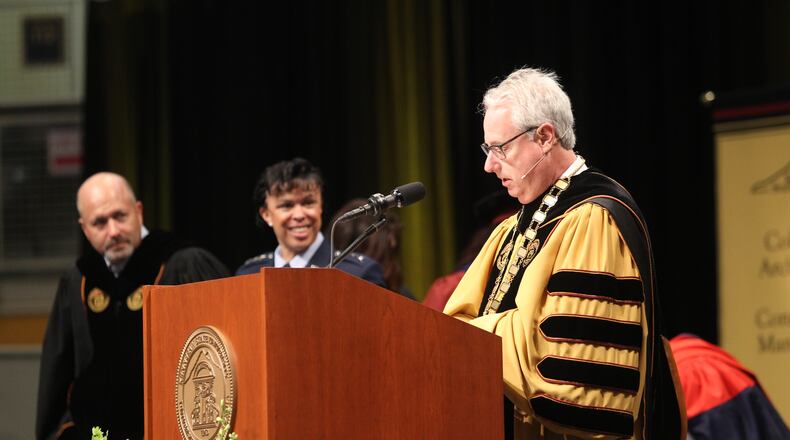The recent decision by five Kennesaw State University cheerleaders to take a knee during the national anthem at a football game to protest police misconduct has put the university, and president Sam Olens, in the middle of the ongoing dispute about the appropriateness of such actions.
Olens assured Cobb County Sheriff Neil Warren the kneeling would “not happen again,” according to one news report. Before the next game, KSU’s athletics department decided that cheerleaders would no longer be on the field during the anthem. The cheerleaders knelt in the stadium tunnel during the anthem the following game.
Olens initially agreed to an interview with The Atlanta Journal-Constitution on Wednesday to discuss how he tries to balance the viewpoints of students, faculty and community leaders on controversial issues. His office cancelled the interview, citing scheduling conflicts.
Olens answered some written questions on Friday. Here are five questions and his responses.
Q: What has been your approach in managing issues dealing with race, gender identity and social justice on campus?
A: The key to dealing with any issue is to listen first and then engage in open dialogue. Since coming to KSU, I have met with individuals and groups and will continue to do so. I have regular office hours where students are invited to meet with me. I also work closely with the University's three governing bodies -- the faculty, staff and student senates -- who share with me concerns and suggestions from their constituents.
Q: Was there any pressure or demands from any individuals and organizations to change the policy regarding cheerleaders at sporting events?
A: No
Q: Have there been any major donors or boosters who’ve said they’ll no longer make contributions to KSU because of this?
A: To the best of my knowledge, no.
Q: What’s your response to people who don’t believe the university’s explanation regarding the change in when cheerleaders arrive on the playing field?
A: Decisions about game day programming is the responsibility of KSU's Department of Athletics and they have been clear about their reasons for making the adjustment.
Q: Will there be any upcoming meetings with student groups and/or community organizations to discuss some of the issues that have emerged from situations like the cheerleaders kneeling or the removal of social justice pedagogy from a job description? If so, what would you hope to get from this?
A: We are continually having discussions about ways to engage with students and the campus community on critical issues and will continue to do so.
About the Author
Keep Reading
The Latest
Featured



